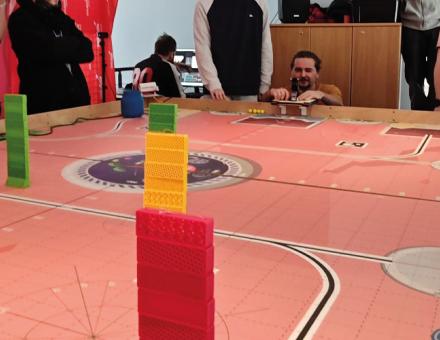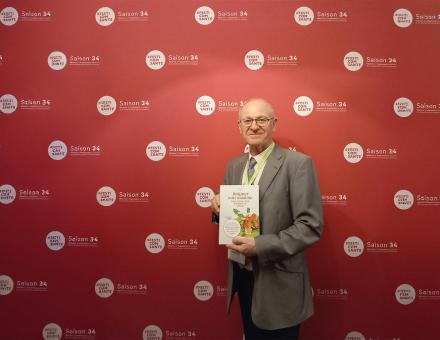On March 25, UniLaSalle had the privilege of welcoming Roland Lehoucq as part of the series of meetings “Les auteurs nous parlent” (Authors talk to us), dedicated to exchanges between Lasallian students and writers. During this event, the students were able to talk with the astrophysicist and science popularizer about the collective work Dune: une exploration scientifique d'une planète-univers (Dune: scientific exploration of a planet-universe), to which he contributed.
The astrophysicist, a specialist in theoretical physics and cosmology, is known for his work in popularizing science, particularly by linking science to science fiction. He analyzes the scientific concepts behind works of fiction, exploring their plausibility. The author of numerous books and a passionate lecturer, he helps to make science accessible to the general public.

Roland Lehoucq, you are an astrophysicist but also a science communicator. What made you want to popularize science? What role do you think scientists like you should play in general culture and society?
Roland Lehoucq - “What made me want to popularize science goes back a long way. When I was 17, I started out as an activity leader in astronomy camps. Very quickly, I felt a deep desire to pass on, teach and share my knowledge, and it has never left me.
There have been several stages in my career. After this first experience of facilitation, I continued my studies, and then, at the end of them, around 1995-1996, I started to write popular science texts and articles. I first wrote for Pour la Science, where I created the Physics Ideas section, taken over four years later by two colleagues who still run it today, more than twenty years later. I also hosted another section, Science and Fiction, for five years, and I have been collaborating for 25 years with the science fiction magazine Bifrost.
In parallel to writing, I have published several works with the aim of disseminating scientific knowledge in other formats. I have also given numerous lectures, between 50 and 60 per year, which is more than one per week on average. This is another essential means of transmitting science, in addition to writing and teaching.
For a long time, I taught physics to future physicists, particularly at the École polytechnique and Centrale Paris. Then, when those contracts ended, I broadened my teaching to another audience, integrating physics into a more general framework of “natural sciences” for students in the humanities. For the past twenty years or so, my research and teaching have focused particularly on issues of climate change, energy and our relationship to the environment.
Today, my work revolves around the triptych of matter-energy-climate. As a physicist, my approach is primarily based on these aspects, but it also extends to the biological, chemical, political and ethical dimensions of these crucial issues. This intellectual journey, built up over more than twenty years, has led me to devote myself exclusively to these themes in my teaching.”
Your book analyzes Dune through numerous scientific disciplines. Of all these approaches, which do you think is the most fruitful for fostering a dialogue between science and fiction with a student audience?
Roland Lehoucq - “In the book I edited, I only wrote one chapter, but the book covers a wide variety of topics related to Dune. There is a chapter on interstellar travel, others on energy - in particular the origin of Fremen energy - on spice and its chemistry, on religions, linguistics, gender with the Bene Gesserit, and on American culture. Moreover, one of the authors, Chris Robinson, has analyzed how certain scenes in the novel are directly inspired by real events in American politics, which he, as an American, perceives immediately, whereas I would not necessarily have made the connection.
This multiplicity of approaches is what makes Dune so interesting: it can be approached from many complementary angles, which enrich the work far beyond its spectacular aspect, whether as a novel or a film. Of course, the work is primarily designed to captivate and transport the reader or viewer. But beyond this aspect, it also opens the door to a multitude of analyses.
This is also what makes it interesting for students from all walks of life. A physicist will discover scientific concepts related to his field, a chemist will be interested in the analysis of spices, a philosopher will explore the implications of the ideas developed in the novel, a linguist will be able to look at the words invented by Frank Herbert and their creation process. Everyone can thus find an entry point that speaks to them, while discovering other perspectives that enrich their understanding of the work.
It is precisely this aspect that I find fascinating in science fiction. It is a genre in which science is much more than just a backdrop. Unlike other literature in which scientific advances serve as a background – novels from 40 years ago mentioned rotary telephones, while today's novels talk about smartphones – science fiction places science and technology at the heart of the plot. But it is not a purely demonstrative science: it is used to feed plots, create tension and raise profound questions. It serves as a thought experiment, making it possible to imagine the social and political consequences of technological advances on humanity.
This is what makes Dune a masterful work. It can be analyzed from the perspective of the time it was created, but also through a contemporary reading, echoing our current concerns. It perfectly illustrates an essential idea: the sciences are not compartmentalized, they are interconnected. Of course, in an academic curriculum, one gradually specializes – one moves from a generalist vision in secondary school to specialized fields such as sedimentology in geology, for example. But this specialization should not make us forget the importance of an overall vision, of a global approach integrating physics, biology, chemistry and even the humanities and social sciences.
This is precisely what science fiction allows: it offers a broader perspective, a “defocusing” that reconnects each discipline with the others and with the human world. It is a literature that is not limited to telling stories, but which offers a reflection on our society and our possible futures.
As for its visionary aspect, it is often emphasized, but that is not its primary purpose. Science fiction does not seek to predict the future; it asks questions, it explores possibilities. Some works turn out to be surprisingly accurate in hindsight, but that is never their initial objective. We remember the authors who anticipated certain developments, and we forget those who were wrong. But their interest does not lie in the accuracy of their predictions, but rather in the reflections they have prompted us to make.”
Dune is often cited as a profoundly ecological work. In your opinion, how can this work raise the ecological awareness of the younger generations, particularly in a school like UniLaSalle, which provides training in life and earth sciences?
Roland Lehoucq - “The world of Dune is eco-fiction, but it is not the only work of its kind. What is particularly interesting about Dune is that it presents a world where resources are scarce, where life is extremely difficult, especially in a hot, desert environment with little water, at least for the Fremen. On the other hand, the inhabitants of the Imperium live in opulence, with vast resources and advanced technology guaranteeing them all the comfort they could wish for. This opposition perfectly illustrates how science fiction allows us to take a step back from our own world by offering a different setting, where the imaginary allows freedom of exploration and reflection.
Science fiction, by offering this step back, allows us to see our own reality from a different angle. In the world of Dune, the rules of the world are established and accepted, which provides fertile ground for deep reflection on our own society. This approach is particularly relevant for the younger generations, who are growing up in a world where ecological and societal crises are omnipresent. They are almost intuitively aware of this, even if they do not fully understand the details.
On the other hand, it is the older generations who often find it difficult to fully grasp the extent of the problem. Having lived in a world where these concerns were less urgent or less visible, some may adopt an attitude of disinterest. But it is essential that everyone becomes aware of their responsibility in the current situation and of the need to transform their way of life to leave room for maneuver for young people.
This intergenerational transmission should not be a one-way street. Of course, the older generation teaches the younger generation their knowledge and experience, but in return, the younger generation has the right to demand awareness and concrete actions from their elders. This often-neglected trade-off between generations is crucial: young people must be given the intellectual and practical tools to navigate a changing world, but they must also be able to count on previous generations to give them sufficient room for action. This may involve a reduction in the consumption of resources by older generations, so that future generations still have enough to build their own future.
This line of thought is echoed in Dune, where the long term is a central element. Decisions made in the past, such as the Butlerian Jihad, have major consequences for the present. This rejection of thinking machines led to the creation of the Mentats, humans highly specialized in the processing and analysis of information. However, like any intelligence based on data analysis, they remain subject to the principle of bullshit in, bullshit out: if they are provided with erroneous information, their conclusions will be false. This issue, which we encounter today with artificial intelligence, shows the extent to which Dune raises timeless and ever-relevant questions.
Thus, starting from a work of science fiction like Dune makes it possible to approach complex issues from a more accessible and engaging angle. It is often easier to attract an audience by announcing a conference on Dune than on an overly academic subject. This makes it possible to initiate a reflection that might otherwise be less accessible or less attractive to the general public. In short, science fiction is an ideal gateway to discussing substantive topics, making these discussions both captivating and accessible.”
If you had to transpose an element of Dune into our world to advance science or society, which would you choose and why?
Roland Lehoucq - “In the world of Dune, the idea of technological renunciation is a central concept, illustrated in particular by Butlerian Jihad. This fictional movement describes a revolt against thinking machines, leading to their total prohibition. This theme resonates with our current society, where innovation is often perceived as a ceaseless accumulation of new technologies, without questioning their impacts.
However, innovation could also be defined as “one less thing”: learning to do without harmful technology instead of systematically adopting new technology. Today, we are faced with innovations with questionable consequences, particularly artificial intelligence. Its energy cost, its exploitation of resources and its surveillance potential raise questions. Should we then, like Butlerian Jihad, consider renouncing certain technological advances before they become unavoidable and irreversible?
The example of cell phones is a good illustration of this phenomenon. Once they have been widely adopted, it becomes almost impossible to do without them, despite their environmental and social impacts. This dependence on technologies once integrated into our lives raises the question: should we slow down their adoption while there is still time?
Ultimately, this line of thought raises an essential question: should society rethink progress no longer in terms of accumulation, but in terms of selecting beneficial technologies, while rejecting those that pose major risks? “Dune” thus invites us to imagine a future where wisdom takes precedence over blind enthusiasm for innovation.”






